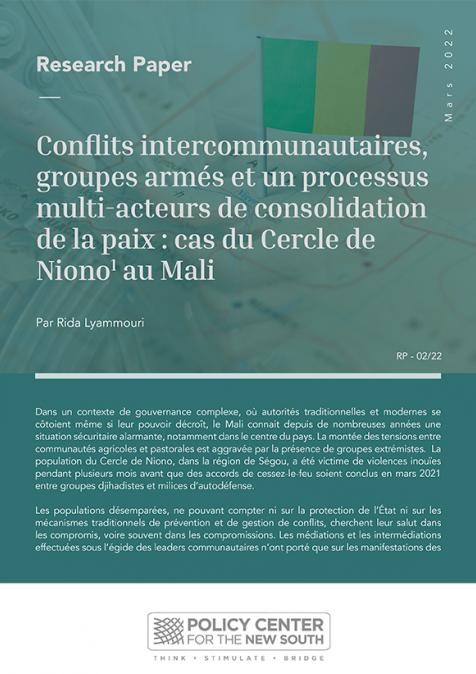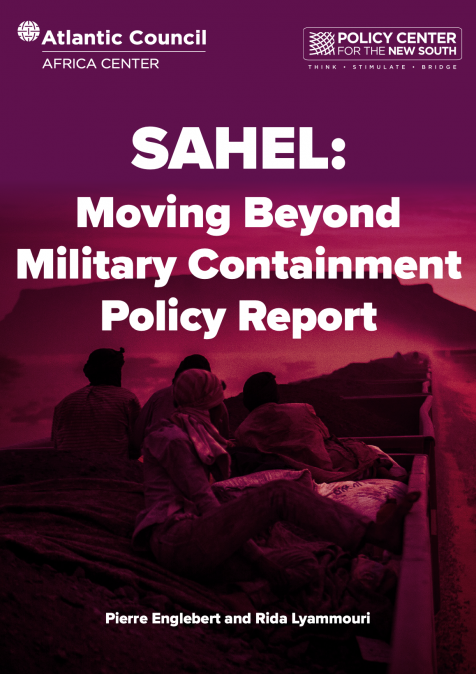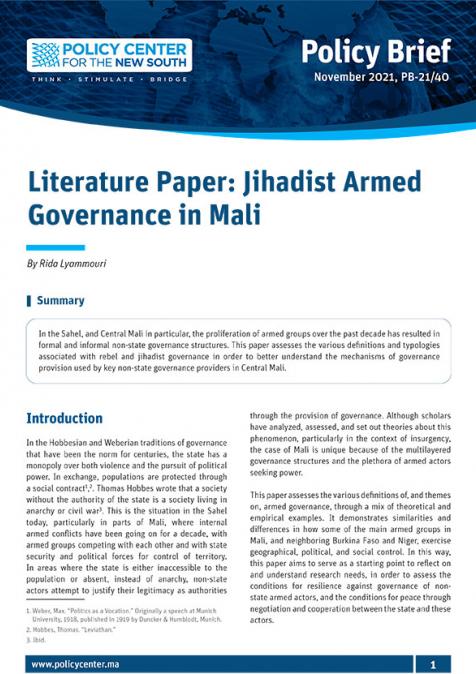In 2024, Africa’s sub-regional landscape reflects deepening tensions between normative commitments to regional integration and the emergence of competing political and security alignments. From institutional paralysis to political withdrawals, the coherence of Africa’s regional blocs is being tested. How are regional groupings adapting to these shifts, and what do current developments reveal about the state of regionalism across the continent? This panel will assess the evolution of Africa’s sub-regional orders, focusing on cases where fragmentation has become increasingly visible, notably in the rupture between the Alliance of Sahel States (AES) and ECOWAS. It will explore whether Africa’s regional architectures can accommodate internal dissent without losing strategic relevance, and how competing political visions and external influences are shaping new dynamics of cooperation—or disintegration. Can regional blocs maintain their role as engines of integration and stability, or are we witnessing a drift toward selective alignments and ad hoc diplomacy?
RELATED CONTENT
-
AuthorsMarch 1, 2022Dans un contexte de gouvernance complexe, où autorités traditionnelles et modernes se côtoient même si leur pouvoir décroît, le Mali connait depuis de nombreuses années une situation sécuritaire alarmante, notamment dans le centre du pays. La montée des tensions entre communautés agricoles et pastorales est aggravée par la présence de groupes extrémistes. La population du Cercle de Niono, dans la région de Ségou, a été victime de violences inouïes pendant plusieurs mois avant que de ...
-
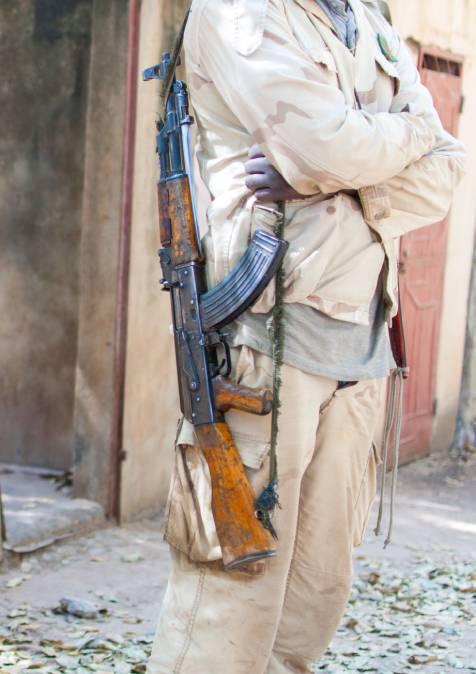 AuthorsFebruary 28, 2022This article was initially published on usip.org The presence of CBAGs raises issues that force a rethink of local implementation of peacebuilding processes. The RESOLVE Network’s multiyear research on Community-Based Armed Groups (CBAGs) has established critical findings for the international community on how to engage, manage and transform violent actors in conflict-affected states. While mitigation efforts tend to target anti-state extremist org ...
AuthorsFebruary 28, 2022This article was initially published on usip.org The presence of CBAGs raises issues that force a rethink of local implementation of peacebuilding processes. The RESOLVE Network’s multiyear research on Community-Based Armed Groups (CBAGs) has established critical findings for the international community on how to engage, manage and transform violent actors in conflict-affected states. While mitigation efforts tend to target anti-state extremist org ... -
Rim Riouch & Abdelhak BassouFebruary 17, 2022Les coups d’état se sont enchainés dans l’actualité africaine, avec quatre pays suspendus par l’Union africaine en une année civile, la sécurité au Sahel avance à reculons. L’invité de ce ...
-
AuthorsPierre EnglebertFebruary 11, 2022Almost ten years after the beginning of the security crisis in the Sahel, Burkina Faso, Mali, and Niger face a graver predicament than ever before. In the throes of multiple insurgencies, they and their foreign patrons, including France, have shown the limits of military containment. While these three countries are the victims of terrorist aggression, their crises also have deep domestic roots, including long-standing patterns of state abuses of their populations, even in the more d ...
-
Rim Riouch & Rida LyammouriFebruary 11, 2022Violence is increasingly endangering the lives of populations throughout the Sahel. Amid this problematic situation, coup d’etats are multiplying. On January 23, a military coup d’etat wa ...
-
December 9, 2021A summit on the African vision of Sahel’s future with a focus on development around the 5 Sahelian Ministers of Economy and the report “Sahel: Moving Beyond Military Containment” ...
-
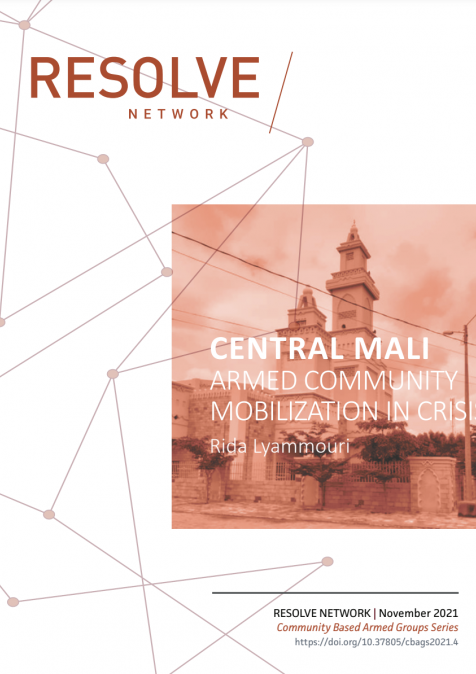 AuthorsNovember 29, 2021The proliferation of community-based armed groups (CBAGs) in Mali’s Mopti and Ségou Regions has contributed to transforming Central Mali into a regional epicenter of conflict since 2016. Due to the lack of adequate presence of the state, certain vulnerable, conflict-affected communities resorted to embracing non-state armed groups as security umbrellas in the context of inter-communal violence. These local conflicts are the result of long-standing issues over increasing pressure on ...
AuthorsNovember 29, 2021The proliferation of community-based armed groups (CBAGs) in Mali’s Mopti and Ségou Regions has contributed to transforming Central Mali into a regional epicenter of conflict since 2016. Due to the lack of adequate presence of the state, certain vulnerable, conflict-affected communities resorted to embracing non-state armed groups as security umbrellas in the context of inter-communal violence. These local conflicts are the result of long-standing issues over increasing pressure on ... -
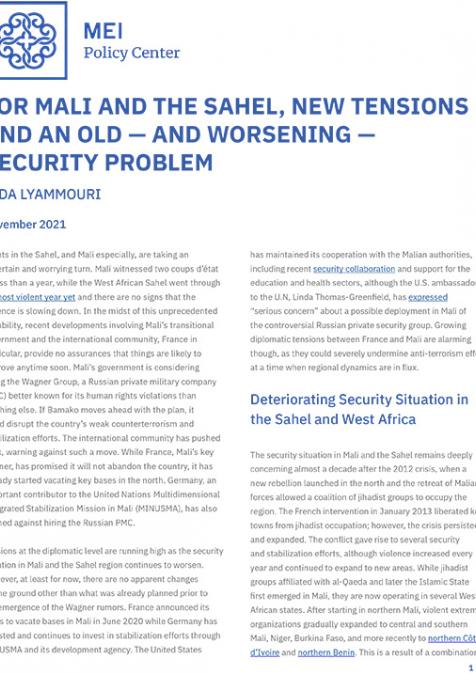 AuthorsNovember 9, 2021Events in the Sahel, and Mali especially, are taking an uncertain and worrying turn. Mali witnessed two coups d’état in less than a year, while the West African Sahel went through its most violent year yet and there are no signs that the violence is slowing down. In the midst of this unprecedented instability, recent developments involving Mali’s transitional government and the international community, France in particular, provide no assurances that things are likely to improve any ...
AuthorsNovember 9, 2021Events in the Sahel, and Mali especially, are taking an uncertain and worrying turn. Mali witnessed two coups d’état in less than a year, while the West African Sahel went through its most violent year yet and there are no signs that the violence is slowing down. In the midst of this unprecedented instability, recent developments involving Mali’s transitional government and the international community, France in particular, provide no assurances that things are likely to improve any ... -
AuthorsNovember 2, 2021In the Sahel, and Central Mali in particular, the proliferation of armed groups over the past decade has resulted in formal and informal non-state governance structures. This paper assesses the various definitions and typologies associated with rebel and jihadist governance in order to better understand the mechanisms of governance provision used by key non-state governance providers in Central Mali. ...
-
AuthorsPascal ChaigneauEugène BergRodolphe MonnetJacques GravereauJérémy GhezOlivier TramondNiagalé BagayokoAlain Oudot de DainvilleJérôme EvrardCoordination de l’ouvrage: Imane LahrichFatine CherkaouiOctober 28, 2021Depuis l’accession au trône du Roi Mohammed VI, l’Afrique s’est transformée en priorité de la diplomatie marocaine. Sur le plan économique, l’Afrique est devenue le prolongement naturel du Maroc en termes d’investissements et d’implantations. Pascal Chaigneau s’attarde sur les relations affaiblies Europe-Afrique, l’ambitieuse relation Chine-Afrique ainsi que les relations entre la Russie, les Etats-Unis, la Turquie ou encore les pays du Golf et l’Afrique. Ce chapitre traite égalemen ...

